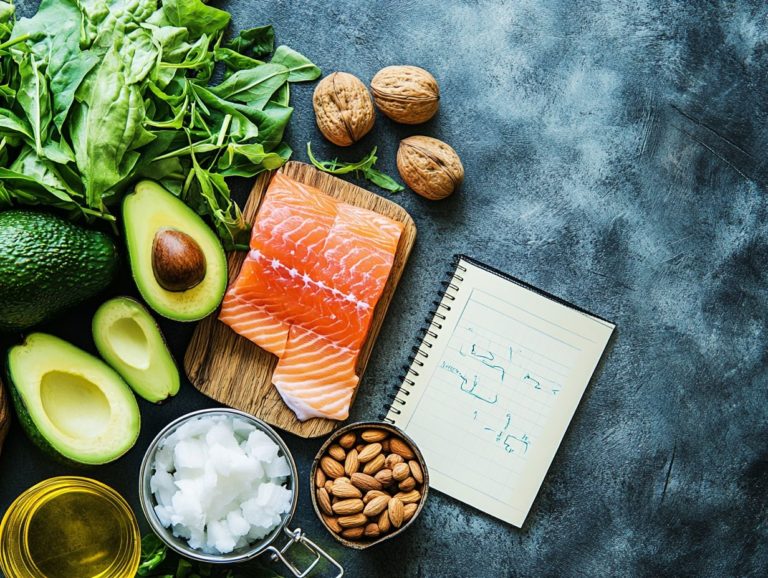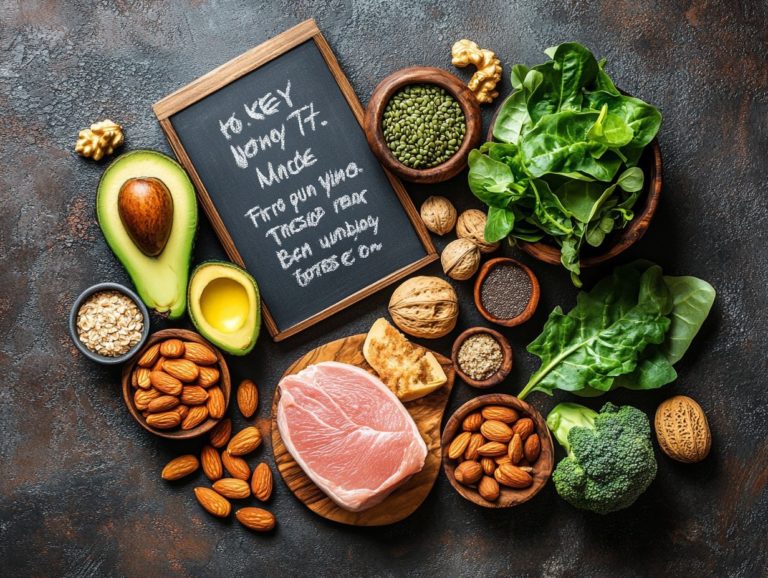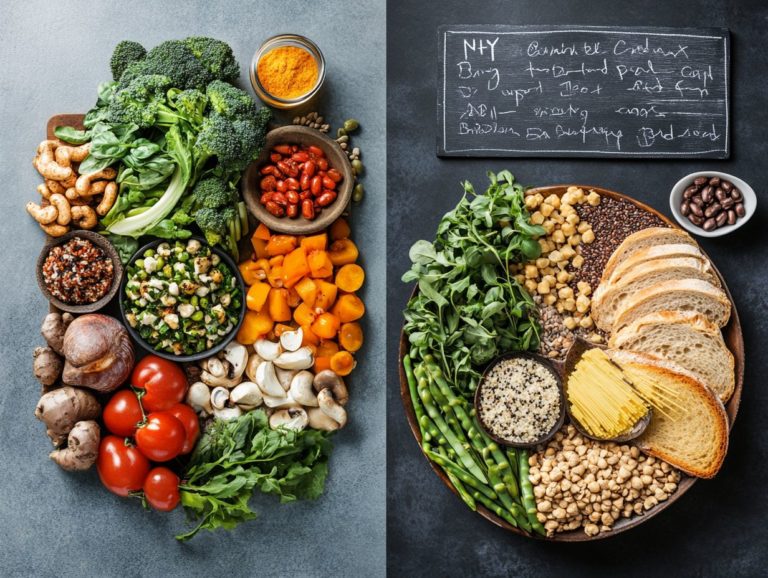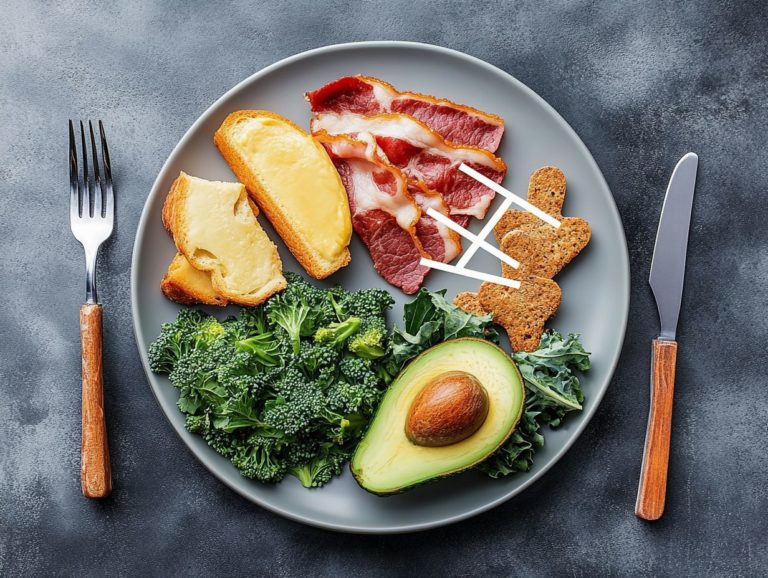Keto-Friendly Foods: Nutritional Insights
The ketogenic diet has surged in popularity, celebrated for its potential benefits that span from weight loss to enhanced energy levels. If you re intrigued by how this low-carb lifestyle can elevate your health, this article will illuminate the key advantages of the keto diet, showcase a selection of delectable keto-friendly foods, and pinpoint the items you should steer clear of, including potential nutrition risks. Start your journey towards better health today!
You ll also find practical tips for seamlessly incorporating these nutritious options into your daily meals. Explore how the keto diet can revolutionize your eating habits and elevate your overall well-being!
Contents
Key Takeaways:
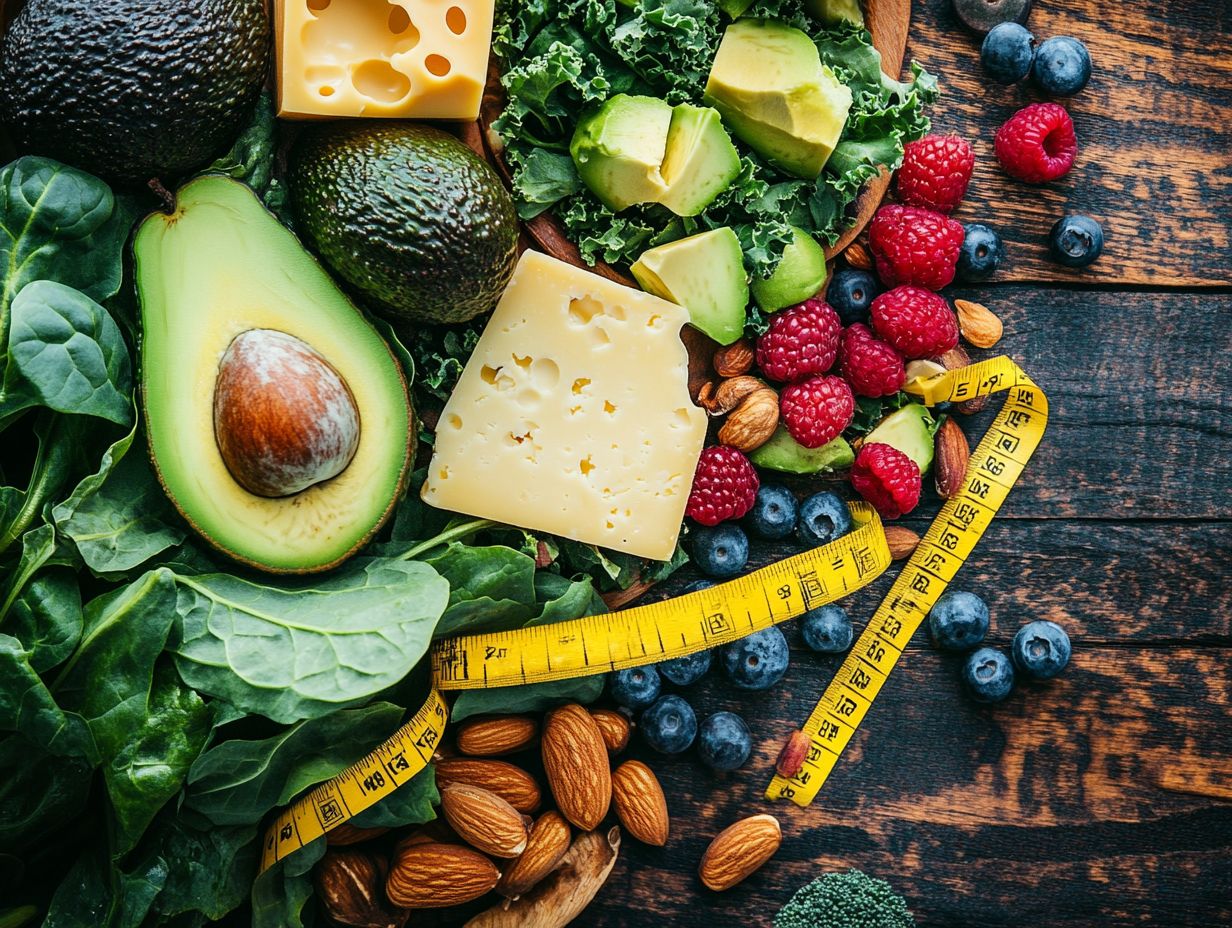
- A keto diet can lead to weight loss, improved blood sugar control, increased energy levels, and reduced inflammation.
- Keto-friendly foods include avocado, eggs, olive oil, salmon, and spinach, as well as other high-fat foods and healthy snacks like nuts and cheese.
- Foods to avoid are grains, starchy vegetables, sugar, and processed foods.
What Are the Benefits of a Keto Diet?
The ketogenic diet, commonly known as the keto diet, is a high-fat, low-carb eating plan that has surged in popularity, and for good reason. This dietary approach not only promotes weight loss but also encourages your body to burn fat for fuel instead of carbohydrates, resulting in the production of ketone bodies (substances produced when your body burns fat for energy). High-fat diets like keto often include a variety of keto-friendly foods and healthy proteins, which can support sustainable weight loss.
Think about the benefits: improved blood sugar control and a promising option for those dealing with health challenges like type 2 diabetes and metabolic syndrome. By prioritizing good fats, proteins, and low-carb foods, along with healthy eating practices and keto-friendly snacks, you can unlock a host of health improvements that transform your well-being.
1. Weight Loss
One of the most significant advantages of the keto diet is its remarkable ability to promote effective weight loss through a high-fat, low-carb approach. This strategy minimizes net carbs in your meals.
This metabolic shift supports fat loss and helps stabilize your blood sugar levels. This stabilization can effectively reduce appetite and cravings. As you incorporate higher amounts of healthy fats and quality protein sources into your meals, you may find it easier to stick to your dietary guidelines. These nutrient-rich foods provide lasting satiety, making it less likely that you’ll consume excess calories throughout the day.
In this way, the keto diet not only facilitates weight loss but also promotes overall well-being through mindful eating practices.
2. Improved Blood Sugar Control
The keto diet is renowned for its ability to enhance blood sugar control, making it a valuable option for individuals managing health conditions like type 2 diabetes.
This low-carb plan cuts down sugars and starches significantly, both of which are notorious for causing spikes in blood glucose levels. By minimizing these carbohydrate sources, your body shifts to fat as its primary energy source, which can lead to improved insulin sensitivity and more stable blood sugar levels. High-fat diets, particularly those incorporating omega-3 fats, are known for their significant health benefits.
You may find that enhanced metabolic health arises from reduced insulin resistance, facilitating a more efficient use of energy and better cholesterol levels. By incorporating nutrient-dense foods, such as leafy greens and healthy fats, you can further support balanced blood sugar while promoting your overall well-being.
3. Increased Energy Levels
Adhering to a keto diet can elevate your energy levels as your body transitions from using glucose to ketone bodies for fuel. Ketone bodies are an alternative energy source that your body uses when carbs are low. This significant shift in energy sources enables you to access a more consistent and efficient supply, effectively minimizing the spikes and crashes often linked to carbohydrate consumption.
As you embrace a high-fat diet, you’ll likely notice improved mental clarity and focus, as your brain naturally prefers ketones over glucose. By incorporating premium fats from sources like avocados, nuts, and olive oil alongside healthy proteins from animal proteins and seafood you can maintain stable blood sugar levels. This, in turn, enhances your overall cognitive function.
This transition not only supports your physical performance but also cultivates a sense of mental sharpness that many individuals find immensely beneficial in their daily lives.
4. Reduced Inflammation
The keto diet can significantly reduce inflammation in your body. This is due to healthy fats, especially omega-3 fatty acids. Additionally, the diet s emphasis on high-fat veggies and low-carb fruits can also contribute to this benefit.
These essential fatty acids, which are abundant in sources like fatty fish, flaxseeds, and walnuts, play a pivotal role in helping your body manage inflammation. By incorporating these healthy fats into your diet, you may not only find relief from chronic inflammation but also enhance your heart health, lower the risk of cardiovascular diseases, and support your overall well-being. This is particularly beneficial for those managing health conditions like Alzheimer’s disease.
Managing inflammation can be especially beneficial if you re dealing with health conditions such as arthritis or inflammatory bowel disease, providing a protective layer against the negative impacts of these ailments. Ultimately, embracing a diet rich in omega-3s can lead to a more balanced inflammatory response, promoting a healthier you.
What Are Some Keto-Friendly Foods?
When you embark on a ketogenic diet, it’s essential to include a diverse array of keto-friendly foods rich in healthy fats while keeping carbohydrates to a minimum. This balanced approach not only fosters optimal health but also effectively supports your weight loss journey. Incorporating animal proteins, keto-friendly fruits, and non-starchy vegetables can add essential nutrients to your diet.
1. Avocado
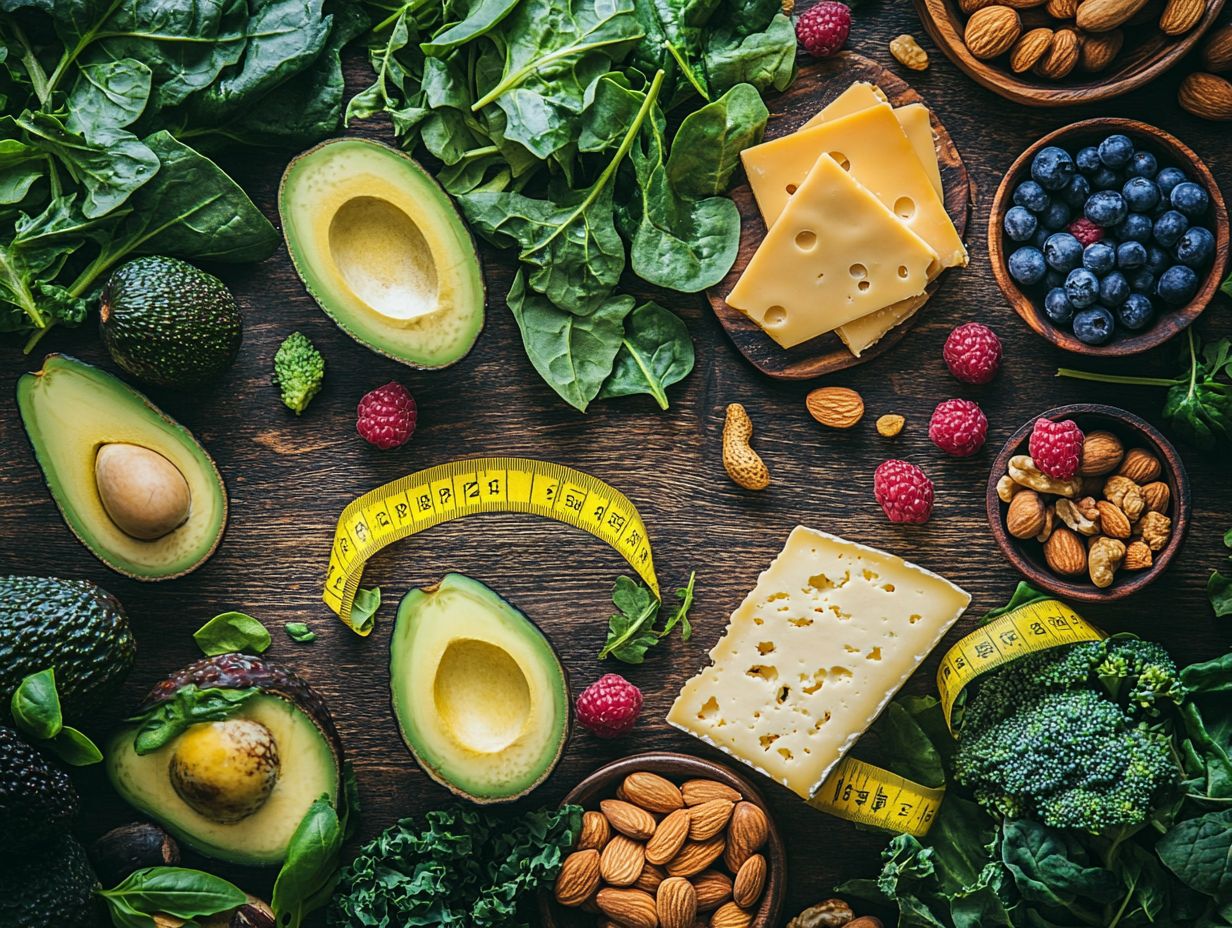
Avocado stands out as a premier keto-friendly food, celebrated for its abundant healthy fats, particularly monounsaturated fats, which are excellent for heart health.
Beyond its heart-loving qualities, this remarkable fruit offers an impressive array of vitamins and minerals, including potassium, vitamin E, and various B vitamins. These nutrients not only elevate your overall well-being but also seamlessly align with a low-carb lifestyle, supporting your nutritional balance.
The creamy texture of avocados makes them an exquisite addition to countless recipes, from vibrant salads and refreshing smoothies to luscious spreads and savory sauces. Their inherent richness not only enhances the flavor of your dishes but also boosts satiety an essential factor for anyone pursuing a keto diet focused on wholesome eating.
With avocados, you won’t just satisfy your cravings; you’ll embark on exciting culinary adventures!
2. Eggs
Eggs are a remarkable source of protein and a cornerstone of the keto diet. They deliver essential nutrients while keeping your carbohydrate intake impressively low.
Packed with high-quality protein, eggs provide all nine essential amino acids required for muscle repair and growth. This is why they re a go-to for fitness enthusiasts and anyone committed to a healthy lifestyle.
The versatility of eggs is unparalleled; you can easily incorporate them into a wide array of recipes, from hearty breakfast scrambles to decadent custards, accommodating various dietary preferences.
Plus, their compact size and affordability make them an incredibly convenient choice for those looking to elevate their nutrition without straining their budget. Whether you enjoy them poached, boiled, or baked, this powerhouse food can play a significant role in your balanced diet, emphasizing wholesome ingredients that nourish your body.
3. Olive Oil
Olive oil stands out as a heart-healthy fat, integral to the keto diet. It supports your overall well-being while delivering noteworthy anti-inflammatory benefits.
By incorporating this golden elixir into your meals, you elevate the flavors and take a significant step towards enhancing your cardiovascular health. This makes it an outstanding option for those who prioritize heart wellness.
Packed with monounsaturated fats, olive oil aids in managing cholesterol levels, thereby reducing the risk of heart disease.
For anyone adhering to low-carb diets, olive oil is the ideal cooking oil, thanks to its high smoke point and versatility. Whether you re saut ing vegetables or drizzling it over a fresh salad, olive oil fits seamlessly into a variety of dishes. It is also a perfect companion for keto alternatives like Shirataki noodles and keto cheese.
Its antioxidant properties offer extra health benefits, allowing you to savor your meals without sacrificing nutrition.
4. Salmon
Salmon is not just a delicious choice; it’s a powerhouse of omega-3 fats and high-quality protein. It makes an essential addition to your keto diet.
Including this fish in your meals can help balance your macronutrient ratio while supporting your heart health. These essential fatty acids are vital for cardiovascular health, helping to reduce blood pressure and lower inflammatory markers in your body.
By regularly enjoying salmon, you can improve your cholesterol levels, as it boosts the good HDL cholesterol. This nutrient-rich fish is packed with various vitamins and minerals, including B vitamins and selenium, all of which contribute to your overall wellness. Incorporating salmon and other seafood into your diet can help meet your fish intake recommendations.
You ll love how salmon not only delights your taste buds but also aligns perfectly with your goals of maintaining a healthy balance of fats and proteins. It s no wonder many consider it a superfood, especially for those conscious about heart health and looking for high-protein and high-quality sources of nutrition.
5. Spinach
Spinach is a powerhouse leafy vegetable, brimming with nutrients while being low in carbs. It s the ideal vegetable substitute for your keto meals and a great addition to a low-carb diet.
Incorporating spinach into your daily meals significantly elevates your overall health. This versatile green is packed with essential nutrients like iron, calcium, and antioxidants, making it a must-have in your diet.
You can toss it into salads for a vibrant crunch or blend it into smoothies. Spinach seamlessly merges with fruits, providing a delightful nutritional boost and increasing your vegetable intake.
By adding spinach to your meals, you can enhance your vegetable intake, support your heart health, and promote better digestion all while savoring the diverse flavors it brings to your healthy eating journey.
What Are Some Foods to Avoid on a Keto Diet?
When you embark on a keto diet, it becomes essential to steer clear of specific foods that may impede your progress. Pay particular attention to those high in carbohydrates, sugar, and grains, as they can undermine your efforts and derail your journey to success.
Following dietary guidance and focusing on low-carb and keto foods is key to achieving your goals.
1. Grains and Starchy Vegetables
Grains and starchy vegetables are foods to avoid on a keto diet. They have a high carbohydrate content that can easily disrupt ketosis.
When you consume foods like wheat and rice, your body converts these carbohydrates into glucose. This leads to a surge in insulin levels.
Starchy vegetables like potatoes and corn contain significant carbohydrates that can obstruct fat burning. Instead, consider cauliflower and zucchini as substitutes.
If you’re committed to a ketogenic lifestyle, focus on low-carb alternatives. Prioritize non-starchy vegetables, healthy fats, and high-fat veggies like avocados.
2. Sugar and Sweetened Foods
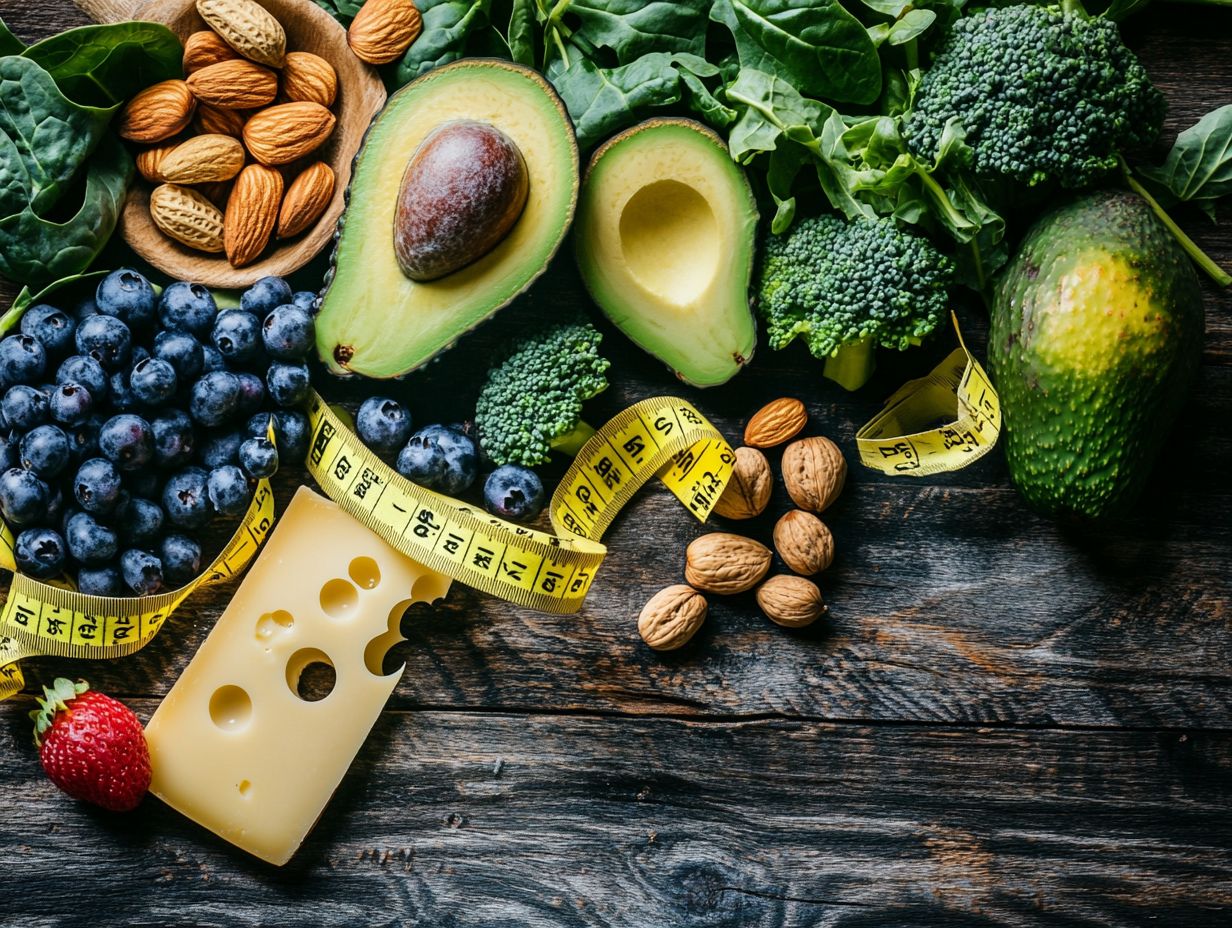
Sugar and sweetened foods can derail your keto diet. They trigger blood sugar spikes that can affect your weight loss efforts.
Consuming these sugars can lead to insulin resistance over time. Be vigilant about hidden sugars in processed foods, including condiments and snacks.
Even alternative sweeteners can have drawbacks. Choose natural options like plant-based milk and unsweetened beverages to stay on track.
3. Processed Foods
Processed foods are often brimming with unhealthy fats, sugars, and preservatives. These additives can undermine your weight loss efforts and lead to health issues.
When you lean too heavily on processed options, you risk missing out on the essential nutrients that whole foods offer. It’s vital to incorporate natural foods that are rich in fiber, vitamins, and healthy fats into your diet.
By prioritizing whole foods over processed ones, you can support your metabolic function, curb cravings, and achieve sustainable weight loss. Incorporating food variety with options like Greek yogurt, almonds, and Shirataki noodles can make your meals more enjoyable and nutritious.
4. High-Carb Fruits
When you’re on a keto diet, it’s wise to steer clear of high-carb fruits like bananas, grapes, and mangoes. They can quickly elevate your carb intake.
While these fruits are undeniably delicious, their higher sugar content can impede your journey toward achieving and maintaining ketosis. Consider incorporating berries, avocados, and coconuts into your diet.
Berries are a fantastic choice; they are low in sugar yet brimming with antioxidants. By opting for these keto-friendly alternatives, you can enjoy satisfying sweetness without derailing your dietary goals.
How Can Someone Incorporate Keto-Friendly Foods into Their Diet?
Incorporating keto-friendly foods into your diet demands thoughtful planning and a touch of creativity in meal preparation. This approach ensures that you adhere to the high fat, low carb guidelines while enjoying a diverse and satisfying culinary experience.
1. Plan Meals Ahead of Time
Planning your meals ahead of time is crucial for integrating keto-friendly foods into your diet. Dedicating a few hours each week to meal prepping saves you valuable time during busy weekdays. This practice also helps you with better portion control, significantly reducing the temptation to reach for non-keto snacks when hunger strikes.
With ready-to-eat meals at your fingertips, you minimize the chances of making impulsive eating decisions that could derail your progress. Ultimately, embracing this structured approach enhances your adherence to a ketogenic lifestyle, ensuring that each meal aligns perfectly with your dietary needs while boosting your energy levels and overall well-being.
2. Experiment with New Recipes
Experimenting with new recipes can transform your experience on a keto diet into something truly enjoyable and satisfying, opening the door to a diverse array of flavors and textures. By incorporating keto-friendly ingredients, you can explore a variety of dishes that not only align with your dietary goals but also delight your taste buds.
For example, using cauliflower rice as a substitute for traditional grains creates a hearty base for stir-fries or even sushi. Similarly, swapping out regular pasta for zoodles those delightful zucchini noodles unlocks a world of savory sauces and toppings just waiting to be discovered.
Emphasizing healthy eating becomes a breeze when you learn to utilize avocados, nuts, seeds, and low carb fruits like berries. This approach enriches your meals while promoting better nutritional balance and ensures you maintain a sense of culinary adventure throughout your cooking journey.
3. Be Mindful of Hidden Carbs
Being mindful of hidden carbs in various foods is crucial for you to maintain ketosis on a keto diet.
This vigilance is especially important as you navigate the aisles of processed foods and condiments, where sugar and carbohydrate content can be deceptively high.
To effectively spot these hidden sugars, you should familiarize yourself with food labels, paying close attention to the ingredients list where terms like “syrup,” “maltose,” and “dextrose” frequently pop up.
Recognizing that even seemingly harmless items such as sauces, dressings, and packaged snacks can harbor unexpected carbs enables you to make informed choices. By prioritizing whole, unprocessed foods and exercising caution with ready-made options like plant-based milk and unsweetened beverages, you ll find that maintaining a balanced carbohydrate intake while adhering to a ketogenic lifestyle becomes far more manageable.
4. Listen to Your Body
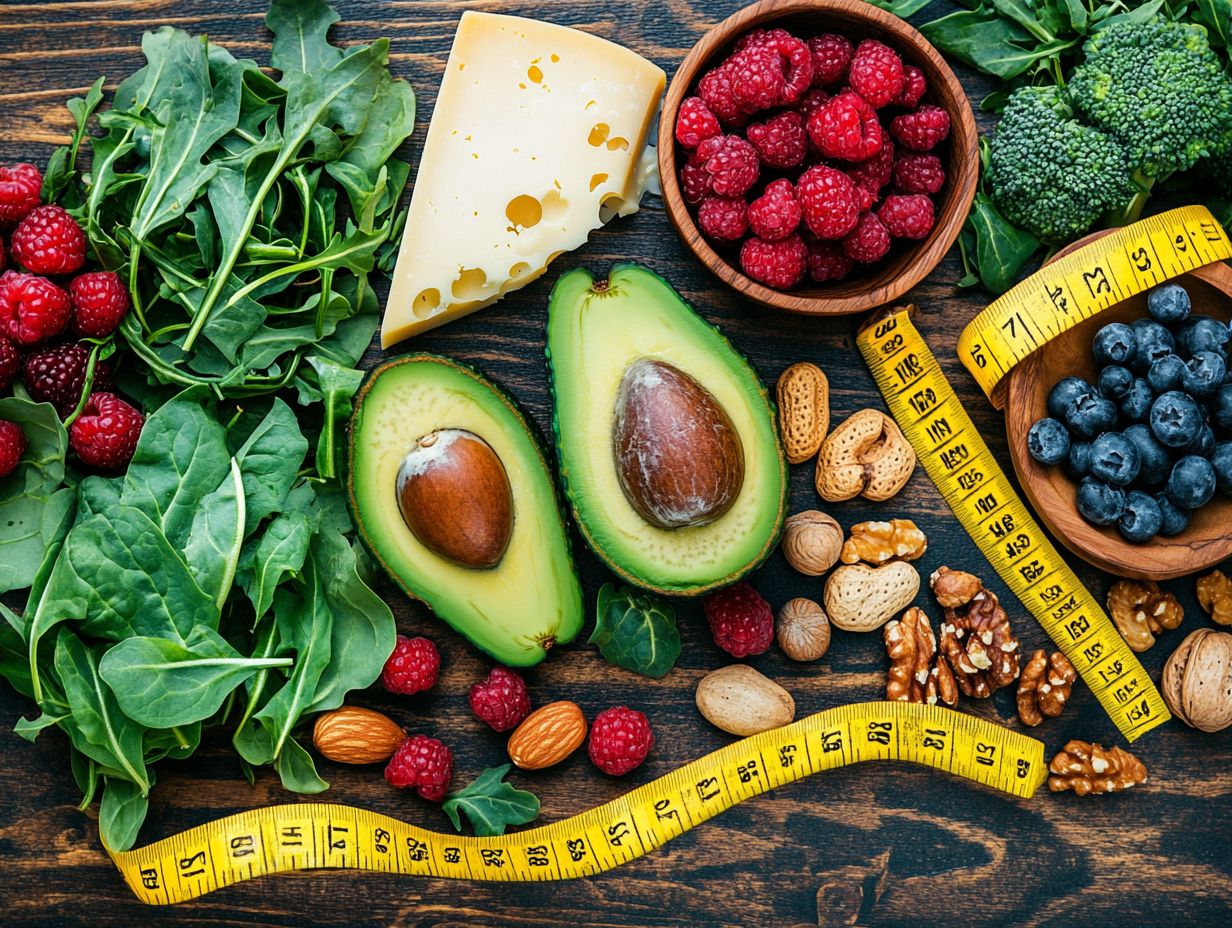
Listening to your body is essential when you embark on a keto diet, as individual responses to high-fat foods can vary widely.
By tuning into your hunger cues and energy levels, you can make informed choices about carbohydrate intake and food selections. This mindful approach enables you to regulate energy fluctuations effectively and recognize when your body may need additional nutrients.
For example, if you find yourself feeling fatigued or excessively hungry, it could signal that you need to adjust your carb consumption to sustain optimal performance and overall well-being. Ignoring these signals might expose you to potential nutrition risks, such as nutrient deficiencies or disruptive eating patterns, which can undermine the benefits of a meticulously crafted keto lifestyle. Additionally, maintaining awareness of conditions like Alzheimer’s disease and the impact of high-fat foods on cognitive health is essential for holistic well-being.
Frequently Asked Questions
What are keto-friendly foods?
When considering keto-friendly foods, focus on low carb and high fat options like avocados, nuts, and seeds. Incorporate almonds, Greek yogurt, and tea into your diet. Additionally, meat and poultry are excellent sources of protein, while dairy products like butter and cheese can help you meet your fat requirements. Beverages like coffee and unsweetened tea also align well with a keto diet.
Keto-friendly foods are foods that are low in carbohydrates and high in healthy fats, making them ideal for those following a ketogenic diet. These healthy foods typically include meats, fish, eggs, nuts, seeds, and non-starchy vegetables like leafy greens.
What makes these foods suitable for the keto diet?
These foods are high in fat and low in carbohydrates, which helps the body enter a state of ketosis. This is where the body burns fat for energy instead of glucose, leading to weight loss and other health benefits.
Can I eat dairy on a keto diet?
Yes, dairy can be included in a keto diet, as long as it is full-fat and low in carbohydrates. Some examples of keto-friendly dairy options include cheese, heavy cream, and full-fat yogurt like Greek yogurt.
What about fruits and vegetables?
While most fruits are high in carbohydrates and should be limited on a keto diet, some low-carb options like berries can be enjoyed in moderation. Non-starchy vegetables such as leafy greens, broccoli, and cauliflower are also great choices for a keto diet. Shirataki noodles made from konjac yam can also be a good low-carb alternative.
Are there any keto-friendly snacks?
Absolutely! Some great keto-friendly snacks include hard-boiled eggs, beef jerky, avocado, and nuts. Ghee is also a great option for adding healthy fats to your snacks. Just be sure to check the nutrition labels for any added sugars or carbs.
Potential Downsides of a Keto Diet
Are there any potential downsides to a keto diet?
Some people may experience symptoms when their body adjusts to a low-carb diet. This can include headaches, fatigue, and irritability.
It’s crucial to consult with a healthcare professional before starting any new diet. Be mindful of the potential long-term health effects, such as the impact on conditions like Alzheimer’s disease.

